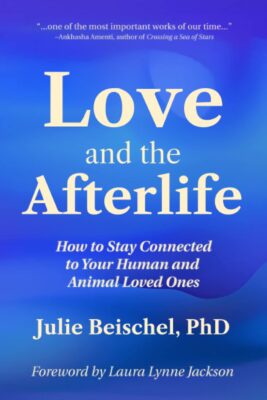People have believed in an afterlife since as least the time of the Neanderthals who buried the dead with flowers, jewelry, and utensils, most likely for use in the next world. And for just as long, people have recognized that our departed loved ones (DLOs) continue to exist in our lives after the death of the body.
Experiences of after-death communication (ADCs) have been reported in all known cultures across the world since time immemorial. They’re not weird or rare or indicative of mental illness. They are natural and ubiquitous.
Probably the most common type of ADCs are dreams. That makes sense: dreams involve an altered state of consciousness that people regularly experience so the possibility for contact is significant. The dream state allows for the quieting of the frontal cortex and of our analytical, reasoning, and logical capacities. This, in turn, is conducive to communication and other psi [psychic] phenomena.
These are often called “visitation dreams.” Some researchers prefer to use the term “sleep ADC” rather than “dream ADC” because, unlike normal REM dreams, these ADC experiences usually feel subjectively real. Windbridge Certified Research Medium Laura Lynne Jackson calls them “3D dreams.” It’s the difference between dreaming about someone and dreaming with them. Additionally, these sleep ADCs are often remembered in great detail for years, which doesn’t usually occur with regular REM dreams.
Sleep ADCs have been studied by researchers since the 1880s. Similar to ADCs in general, the prevalence numbers are all over the map. However, the numbers are slightly higher and more focused for sleep ADCs. Generally, researchers report sleep ADCs in 50-85% of survey respondents.
At the Windbridge Research Center, we collected ADC reports for an educational initiative named “Audrey’s Project.” Of the stories collected for Audrey’s Project, around 90% were of sleep ADCs. What kicked off the project was an experience Mark [my husband and research partner] had where he spent time with his departed mom, Audrey, during a dream that happened about a month after her sudden passing from COVID-19. Mark rarely remembers his dreams, but this one was so powerful and he had so much trouble conveying in words the experience that he made a video:
In the dream, Audrey was in a lovely house in a forest, next to a lake. She greeted Mark with “a warm smile and joyful eyes.” They didn’t speak during the dream; it was a comfortable silence. Audrey was surrounded by art supplies; she liked creating art in life, but didn’t always have time, working and raising three children. In the dream, Mark sat with his mom, drinking coffee and holding hands. Then they took a walk in the forest. Upon returning to the house, Mark knew it was time for him to go. “But I knew she wouldn’t be alone,” he shared. “I could see that the house was filled with people who loved her, welcoming her home.”
Sleep ADC Features
Sleep ADCs share similarities with waking spontaneous ADCs: the purpose is to convey love and a continuing bond. ADCs in the sleep state offer dreamers an opportunity to say good-bye, address unfinished business, advance the relationship, and/or bring closure. The DLOs (departed loved ones) often appear as if in the prime of their lives and free of illness. The DLO may speak or not and exchange ideas with or without words as Audrey did. The DLO may communicate a specific message. They may appear surrounded by an intensely bright light.
Sleep after death communications often evoke strong emotions and can impact the process of grief. They may include pleasant past memories or experiences as well as memories of the DLO’s illness, dying, or death. They may also show the DLO in the afterlife, comfortable and at peace.
After an ADC, one may feel cared about and that the relationship with the DLO continues. Most people experience their ADC as positive, comforting, and pleasant. ADCs may result in a decreased fear of death and an increased sense of spirituality. In addition to demonstrating a continuing bond with the DLO, ADCs may also lessen anger, guilt, and anxiety.
ADCs interpreted as frightening or confusing usually occur because of a lack of understanding on the part of the experiencer or others. Even if your experience is initially powerful and positive, but then you tell a jackhole about it and they splatter their ignorant judgment all over you, it can transform the experience into something negative. This is why education about ADCs is so important.
 Additionally, if your DLO attempts to connect with you and you are unprepared, you might miss that opportunity. I speak/write from experience. Soon after my mother died and long before I knew about ADCs,
Additionally, if your DLO attempts to connect with you and you are unprepared, you might miss that opportunity. I speak/write from experience. Soon after my mother died and long before I knew about ADCs,
I had a dream where I was in my childhood bedroom listing profession football teams and cities on a dry erase board …as one does. My mom entered the room and approached me. She was young and thin and wearing pajamas. Unlike other dreams I’d had about her, in this one, I recognized that she was there. ‘Well, that can’t be. My mom is dead. She can’t be here,’ I thought. As she got closer and closer, I became more and more anxious. She leaned in to kiss me and my anxiety soared. Just before she made contact, I got so scared that it woke me up.
So, had I understood that ADCs were possible and normal, I might have been able to actually communicate with her. Because I didn’t, it became a nightmare. And she never appeared in my dreams again. Don’t be sad; we found other ways.
Perhaps the most important thing one can do to optimize the possibility of experiencing an ADC is to be open to it. It is important to be open to messages of any kind, not just how or when you think it should happen. Like with any loving two-way relationship, you can’t control the actions of your DLO. You may need to just be grateful for any contact they’re capable of. Assumptions about the possibilities are just roadblocks to connecting. Ideally, you need to be patient and trusting.
This article is an exclusive excerpt from the new book Love and the Afterlife: How to Stay Connected to Your Human and Animal Loved Ones by Julie Beischel, PhD
Author Bio
 Dr. Julie Beischel uses the scientific method to address the mysteries of consciousness. In Love and the Afterlife, she shares evidence that love is eternal and offers suggestions for optimizing your connections to your human and animal loved ones passed.
Dr. Julie Beischel uses the scientific method to address the mysteries of consciousness. In Love and the Afterlife, she shares evidence that love is eternal and offers suggestions for optimizing your connections to your human and animal loved ones passed.
Her card deck, Guidance for Grief, harnesses the power of synchronicity to offer personalized hope and guidance through each user’s unique experience of grief and loss. Each also makes a great gift. Learn more about Dr. Beischel’s work here.
I can’t believe i just read this article. My dreams have always been lucid and colorful, flying around in my dreams that I knew were dreams and assumed everyone had these dreams. Well – It’s been 3 1/2 years since I lost my husband and I have been looking for someone with similar experience, and I feel so good that I am not the only one. Exactly three weeks after my husband passed, and for the next 2 years during my grief and depressed stage (it lasted quite a long time for me!) I would lucid dream of my husband between 2 times a month and sometimes 2 or more times a week. In the dreams I was able to communicate with him physically not verbally. Most times I knew they were dreams and I was able to appreciate every moment that we were together. Other times I just woke up and realized that I was just spending time with him in a real, palpable way. Every time I felt so satisfied, never did I wake up depressed. Every dream had a reassuring message like, he would enter a room and I was okay with not going in because I knew i would enter the room a bit later. Once he was flirting with some other woman and didn’t know I could see him and I woke up laughing, it felt as if he was trying to make me jealous so I would be mad at him instead of pining for him every day. I documented every dream and I can remember them vividly. It was a huge help in my grief journey. I didn’t share this information with anyone as I expected they wouldn’t believe me or understand.
Thank you Anni for sharing your grief story. I’m sorry for the loss of your dear husband. It’s helpful to hear how these dreams are comforting in different ways —I especially love the bit about you waking up laughing from the jealousy dream.